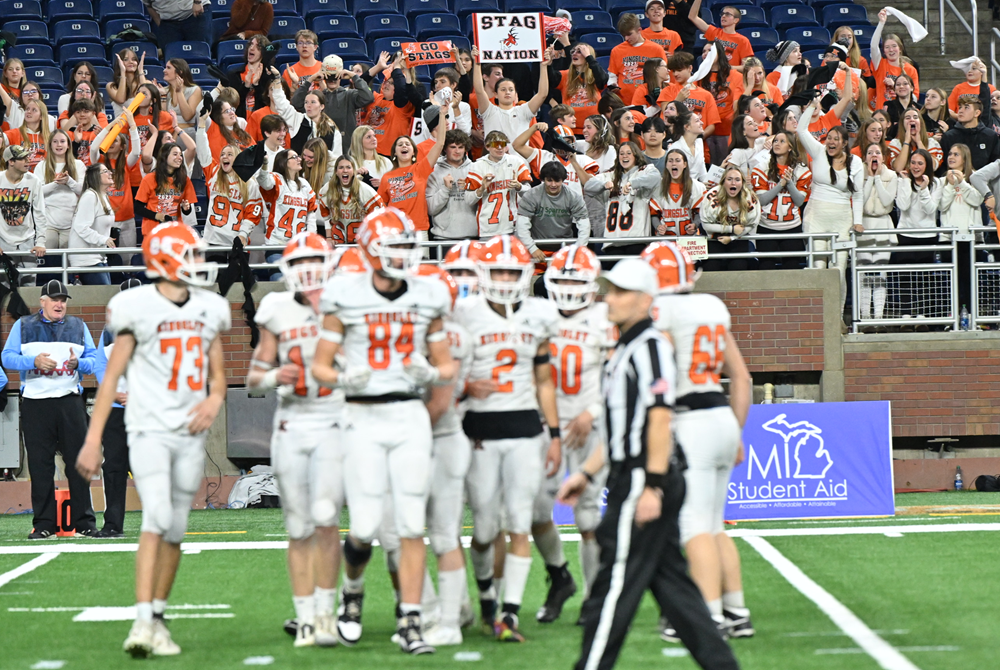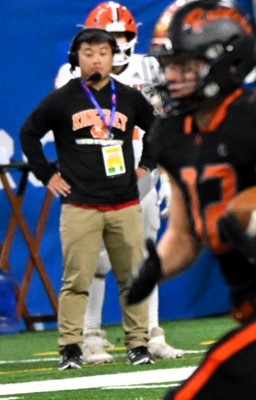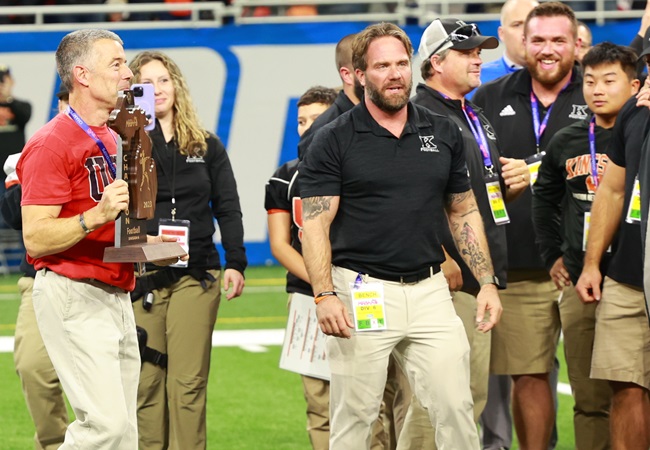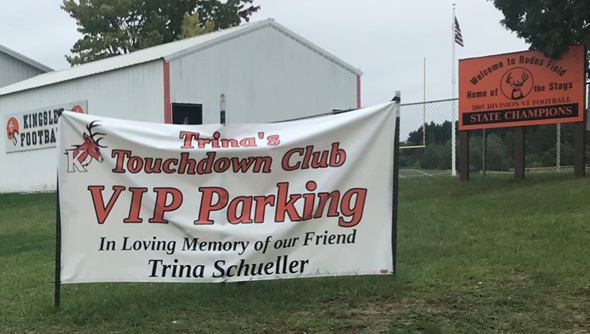
Using Heads in the Heat of Competition
December 20, 2013
By Rob Kaminski
MHSAA benchmarks editor
With so much recent attention to the risks and recognition of concussions in collision sports, athletic leaders have put their heads together to address far more common – but often overlooked – threats to the health of our student-athletes: heat and sudden cardiac arrest.
The No. 1 killer of young athletes is sudden cardiac arrest, while heat stroke victims can surpass that during the year’s hottest months. While the moment of impact leading to a concussion is totally unpredictable, athletic trainers, coaches and administrators have the ability to diminish the occurrences of cardiac arrest and heatstroke. Typically, there is a pre-existing condition, or family history suggesting probabilities for sudden cardiac arrest, which can be treated when detected. And, the perils associated with hot weather – heat stroke, prostration – are almost always completely preventable.
The MHSAA has addressed both issues recently. With assistance from numerous medical governing bodies, the annual pre-participation physical form was revamped and expanded prior to the 2011-12 school year to include comprehensive information regarding participants’ medical history.
In May, the Representative Council adopted a Model Policy for Managing Heat & Humidity (see below), a plan many schools have since adopted at the local level. The plan directs schools to monitor the heat index at an activity site once the air temperature reaches 80 degrees and provides recommendations when the heat index reaches certain levels, including ceasing activities when it rises above 104 degrees.
The topic of heat-related illnesses receives a lot of attention at the start of fall when deaths at the professional, collegiate and interscholastic levels of sport occur, especially since they are preventable in most cases with the proper precautions. In football, data from the National Federation of State High School Associations shows 41 high school players died from heat stroke between 1995 and 2012.
“We know now more than we ever have about when the risk is high and who is most at risk, and we’re now able to communicate that information better than ever before to administrators, coaches, athletes and parents," said Jack Roberts, executive director of the MHSAA. “Heat stroke is almost always preventable, and we encourage everyone to avail themselves of the information on our website.
“Schools need to be vigilant about providing water during practices, making sure that students are partaking of water and educating their teams about the need for good hydration practices.”
All of which is not to say concussions aren’t a serious matter; they are. In fact, leaders in sport safety can take advantage of the concussion spotlight to illuminate these additional health threats.
A recent New York Times story (May 2013) by Bill Pennington featured a February 2013 gathering in Washington organized by the National Athletic Trainers Association. In the article, Dr. Douglas J. Casa, professor of kinesiology at the University of Connecticut and Chief Operating Officer of the Korey Stringer Institute (founded in the late NFL offensive lineman’s name to promote prevention of sudden death in sport), suggests just that.
“All the talk about head injuries can be a gateway for telling people about the other things they need to know about, like cardiac events and heat illness,” said Casa in the article. “It doesn’t really matter how we get through to people as long as we continue to make sports safer.”
Education and prevention methods need to find a permanent place in school programs if those programs are to thrive and avoid becoming targets at which special interest groups can aim budgetary arrows.
Dr. Jonathan Drezner, the president of the American Medical Society for Sports Medicine, said in the New York Times piece that sudden cardiac arrest is “so incredibly tragic and stunning that people aren’t comfortable putting it into the everyday conversation. I do wish, to some extent, it was something people talked more about because we are getting to a place where we could prevent many of these deaths.”
When it comes to heat-related deaths or illnesses, the prevention efforts can be even more successful by educating the masses. And, these efforts can be done at minimal cost to schools.
“That’s the thing about curtailing exertional heat illness: it’s 100 percent preventable, and unlike other health threats to athletes, the solutions can be very low-tech and inexpensive,” said Dr. Michael F. Bergeron, the director of the National Institute for Athletic Health & Performance at the University of South Dakota’s Sanford Medical Center, in the New York Times story.
To assist with cost and data maintenance, the MHSAA has teamed with Sports Health to provide schools with psychrometers (heat measurement instruments) at a discounted rate, and has built online tools to track heat and humidity conditions.
Managing heat and humidity policy
- Thirty minutes prior to the start of an activity, and again 60 minutes after the start of that activity, take temperature and humidity readings at the site of the activity. Using a digital sling psychrometer is recommended. Record the readings in writing and maintain the information in files of school administration. Each school is to designate whose duties these are: generally the athletic director, head coach or certified athletic trainer.
- Factor the temperature and humidity into a Heat Index Calculator and Chart to determine the Heat Index. If a digital sling psychrometer is being used, the calculation is automatic.
If the Heat Index is below 95 degrees:
All Sports
- Provide ample amounts of water. This means that water should always be available and athletes should be able to take in as much water as they desire.
- Optional water breaks every 30 minutes for 10 minutes in duration.
- Ice-down towels for cooling.
- Watch/monitor athletes carefully for necessary action.
If the Heat Index is 95 degrees to 99 degrees:
All Sports
- Provide ample amounts of water. This means that water should always be available and athletes should be able to take in as much water as they desire.
- Optional water breaks every 30 minutes for 10 minutes in duration.
- Ice-down towels for cooling.
- Watch/monitor athletes carefully for necessary action.
Contact sports and activities with additional equipment:
- Helmets and other possible equipment removed while not involved in contact.
- Reduce time of outside activity. Consider postponing practice to later in the day.
- Recheck temperature and humidity every 30 minutes to monitor for increased Heat Index.
If the Heat Index is above 99 degrees to 104 degrees:
All Sports
- Provide ample amounts of water. This means that water should always be available and athletes should be able to take in as much water as they desire.
- Mandatory water breaks every 30 minutes for 10 minutes in duration.
- Ice-down towels for cooling.
- Watch/monitor athletes carefully for necessary action.
- Alter uniform by removing items if possible.
- Allow for changes to dry T-shirts and shorts.
- Reduce time of outside activity as well as indoor activity if air conditioning is unavailable.
- Postpone practice to later in the day.
Contact sports and activities with additional equipment
- Helmets and other possible equipment removed if not involved in contact or necessary for safety.
- If necessary for safety, suspend activity.
Recheck temperature and humidity every 30 minutes to monitor for increased Heat Index.
If the Heat Index is above 104 degrees:
All sports
- Stop all outside activity in practice and/or play, and stop all inside activity if air conditioning is unavailable.
Note: When the temperature is below 80 degrees there is no combination of heat and humidity that will result in need to curtail activity.
PHOTO: The Shepherd volleyball team includes hydration during a timeout in a match this fall.

Football Title Reflects Kingsley's Current Success, Recalls Loved Ones Passed
By
Tom Spencer
Special for MHSAA.com
December 1, 2023
Kingsley football fans have become pretty familiar with VIP parking for home games over the last couple of seasons.
 They may just start looking for a Kingsley VIP lot at Ford Field. The Stags just captured the MHSAA Division 6 championship trophy with a 38-24 victory over Almont, their second Finals championship and first since 2005.
They may just start looking for a Kingsley VIP lot at Ford Field. The Stags just captured the MHSAA Division 6 championship trophy with a 38-24 victory over Almont, their second Finals championship and first since 2005.
The road to the Finals started with Kingsley hosting two playoff games, allowing great use of the VIP Parking of Trina’s Touchdown Club. The lot is adjacent to the school’s Rodes Field and provided in loving memory of Katrina “Trina” Kay Schueller, who passed away Oct. 21, 2021, at Munson Medical Center.
Those playoff games filling Trina’s Touchdown Club’s parking lot featured wins over Mason County Central 61-12 and Manistee 37-18, and 51-27 over Gladstone in the Regional Final. Kingsley then traveled down the road and defeated Reed City 37-7 in the Semifinal.
There may not have been designated VIP parking in Cadillac and Ford Field for the Stags’ followers, but there were a lot of VIPs at both stadiums with Schueller on their minds. Pretty much everyone with an affiliation with the highly-successful program or familiarity with the community’s struggles have become VIPs to the Kingsley coaching staff and many others.
Most certainly among the VIPs are head coach Tim Wooer, assistant coach Conner Schueller, his brother Carter Schueller, and his father Mike Schueller.
Conner was set to play the biggest regular-season game of his career the day after his mom passed. It was the regular-season finale against rival Traverse City St. Francis.
Wooer vividly remembers the moments leading up to that matchup, noting how difficult it was for Conner. But his then-fullback and now-assistant coach demonstrated amazing strength and maturity he stills exhibits today.
 “He’s in his senior football season, and his mom is in the hospital for four weeks — he’s balancing that playing football and going to school,” Wooer recalled. “And then she passes, and he has the strength to come back to school and deliver the news to our team.
“He’s in his senior football season, and his mom is in the hospital for four weeks — he’s balancing that playing football and going to school,” Wooer recalled. “And then she passes, and he has the strength to come back to school and deliver the news to our team.
“I am sobbing watching this kid, and I’m just amazed,” Wooer continued. “The next night is Parents Night, and he’s on the field with his dad and brother without his mom.”
Conner still played, making a 4th-down goal line tackle to prevent a St. Francis touchdown. The Gladiators won the game, but Conner won the day, conquering much just to dress for the game.
The Stags went on to playoff wins over Kingsford 28-10 and Clare 32-6. They bowed out with a 33-18 Regional loss to Frankenmuth.
Conner’s junior year of 2020 had been cut short as the Kingsley was forced to forfeit its District Final to Reed City because several players and coaching staff tested positive for COVID-19. The Stags had Ford Field in their minds that season too after playoff wins over 38-13 Standish-Sterling 38-13 and Gladwin 63-16.
Conner, who celebrated his 20th birthday at Saturday’s Final, remembers his playing days and the challenges presented him.
“At the time it was ‘she’s not there,’ especially my senior year she wasn’t there to watch me and finish it out, but I know she’s watching above,” he said. “We were about to go play Reed City my junior year for Regionals, and everyone got sick and it ended our season unfortunately.”
Those challenges were on his mind at Ford Field, and running through his mind when he saw his brother and father in the stands. Carter, now a senior at Kingsley, had been unable to play football due to injuries.
“I thought about my brother – he unfortunately didn’t play this year due to his injuries, and I don’t really blame him for that,” Conner said. “I thought about him as well because it was just me and my dad and my brother now.
“It was very emotional,” Conner continued. “I got a glimpse of him in the strands.”
Carter also was filled with gratitude for the coaching staff for welcoming and mentoring him. He had become keenly aware of the amount of time coaches spend away from family at practices and going through film.
In addition to his family, Conner was thinking about many others in the Kingsley community – and other senior classes like his that didn’t get the chance to celebrate a championship.
He also was thinking about Justin Hansen, a 2003 graduate of Kingsley. Hansen was a captain on the 2002 conference championship team. He went on to become a special-operations Marine sergeant and was killed in action July 24, 2012, while deployed in Afghanistan. Hansen was on patrol as part of an operation in search of a high-value target when his team was hit with small arms fire.
 On Saturday, Wooer was wearing a red T-shirt with the letters “USA” on the front and the name “Hansen” on the back. It also featured the number 54, Hansen’s in high school.
On Saturday, Wooer was wearing a red T-shirt with the letters “USA” on the front and the name “Hansen” on the back. It also featured the number 54, Hansen’s in high school.
Wooer, who turned 54 in July, wore the shirt in Hansen’s memory knowing Hansen would be on the veteran coach’s mind and symbolizing Hansen’s presence with the team at Ford Field.
Wooer wants to make sure Hanson is never forgotten and reminds the soldier’s family the entire community remains behind them.
“I believe it is part of our job as a community to show our love to this family and help in any way possible to help them get through this process,” Wooers said. “After the funeral, we all went about life.
“We certainly still think about Justin and feel the pain,” he continued. “But nothing like a family does.”
Hansen’s tragic passing led to the creation of the annual Patriot Game in Traverse City in 2012 while Wooer was coaching Traverse City West. The game features crosstown rivals West and Traverse City Central every year and strives to honor veterans, first responders, active duty military, and area heroes who died while serving their country.
Saturday’s win over Almont left Wooer emotionally exhausted after all the preparations to do it right for the senior class, the school, the Kingsley community, the Schueller family and Hansen. Collectively, they’ve really become more like a family to the Stags coaching staff and many, many others.
“In terms of emotions, there is no doubt Justin was on my mind throughout the game,” Wooer said. “Trina and Conner have been – those are two huge pieces.
“And, a lot of my thoughts are with the seniors,” he continued. “You want to win the game, but also it is your last time with them.”
Wooer has learned a lot from his former players and coaches over the years. He’s become close friends with many of them, going back to his early days of coaching as a student-teacher at Elk Rapids. He also coached at Farewell and Traverse City West, the latter from 2008-2017 after a first tenure at Kingsley. He returned to Kingsley in 2018.
Schueller is among several former players and coaches who have been on Wooer’s coaching staffs over the years. Several continue today.
“I could give you lots of other stories about kids I have had,” Wooer said. “There comes this transition where they turn into such amazing men, you catch yourself every once in a while saying, ‘I want to be like him.’
 “You get this huge smile on your face because you’re so proud of them, just like a mother or father would,” Wooer continued. “A coach always looks at his players like they’re part of his family.”
“You get this huge smile on your face because you’re so proud of them, just like a mother or father would,” Wooer continued. “A coach always looks at his players like they’re part of his family.”
In addition to Conner, current assistants with long-term relationships with Wooer are Tom Kaleita, Kyle Smith, Ryan Zenner, Dan Goethals, Josh Merchant, Jordan Bradford, Steve Klinge, Connor Schueller, Mike Arlt, Larry Mikowski, Bobby Howell, Rob Whims and Jason Morrow.
This year’s seniors were Jon Pearson, Eli Graves, Skylar Workman, Gavyn Merchant, Max Goethals, Evan Trafford, Bode Bielas, Grant Kolbusz, James Person, Caleb Bott, Trenton Peacock, Noah Scribner and Gavin Dear. They and the coaching staff will be the center of attention as the community celebrates the football team at 7 p.m. this evening in the high school gymnasium.
The seniors probably won’t need VIP parking tonight. But if it would help, Conner would surely make arrangements to utilize Trina’s Touchdown Club. He’d have to add a shuttle though as Rodes Field is about a mile away from the school.
“It feels amazing — I don’t think it really hit any one yet, but I am sure it will,” Conner said. “After we won, it is truly something – it is something else I can’t explain.
“The seniors finally won it the way they were supposed to,” he continued. “It was a good class of seniors.”
 Tom Spencer is a longtime MHSAA-registered basketball and soccer official, and former softball and baseball official, and he also has coached in the northern Lower Peninsula area. He previously has written for the Saginaw News, Bay County Sports Page and Midland Daily News. He can be reached at [email protected] with story ideas for Manistee, Wexford, Missaukee, Roscommon, Ogemaw, Iosco, Alcona, Oscoda, Crawford, Kalkaska, Grand Traverse, Benzie, Leelanau, Antrim, Otsego, Montmorency, Alpena, Presque Isle, Cheboygan, Charlevoix and Emmet counties.
Tom Spencer is a longtime MHSAA-registered basketball and soccer official, and former softball and baseball official, and he also has coached in the northern Lower Peninsula area. He previously has written for the Saginaw News, Bay County Sports Page and Midland Daily News. He can be reached at [email protected] with story ideas for Manistee, Wexford, Missaukee, Roscommon, Ogemaw, Iosco, Alcona, Oscoda, Crawford, Kalkaska, Grand Traverse, Benzie, Leelanau, Antrim, Otsego, Montmorency, Alpena, Presque Isle, Cheboygan, Charlevoix and Emmet counties.
PHOTOS (Top) Kingsley students support their classmates during Saturday’s Division 6 Final at Ford Field. (2) Stags assistant coach Conner Schueller watches from the sideline during an Almont run back. (3) Kingsley coach Tim Wooer, in red, prepares to present the championship trophy to his team including Schueller, far right. (4) Trina’s Touchdown Club welcomes members to the VIP lot adjacent to the Kingsley stadium. (Ford Field photos by Hockey Weekly Action Photos; touchdown club photo courtesy of the Kingsley football program.)

